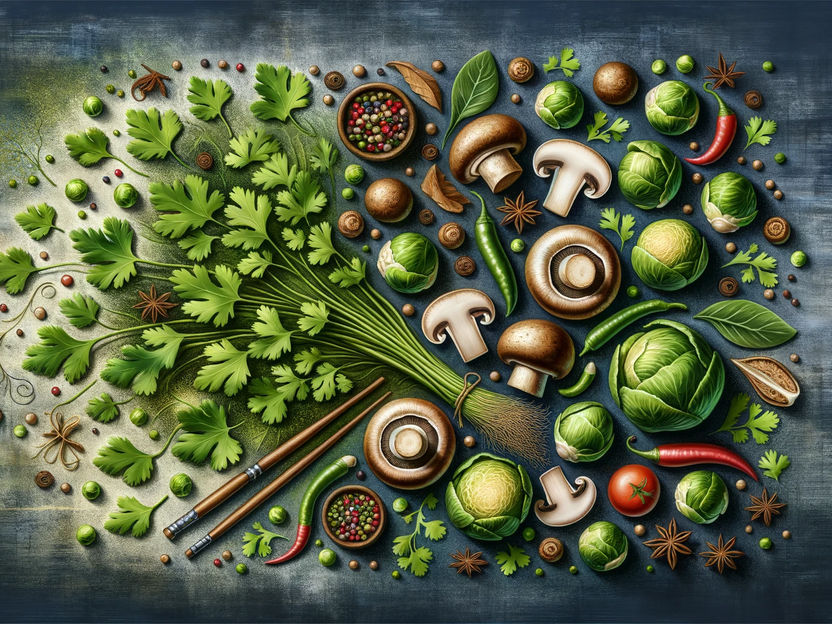Mushrooms, Brussels sprouts & cilantro: how flavor preferences are created
Advertisement
wiebelkuchen and wine, pumpkin soup with freshly baked bread, the first cookies and mulled wine... autumn offers a lot in the way of culinary delights. But not everyone goes into raptures when it's time for kale, venison or gingerbread again. What one person likes, another loathes. But why is that and how can you change the taste? Dr. Bianca Mueller, professor for nourishing science and food technology at the SRH remote university, has answers.

Symbol image
computer generated picture
At the latest on vacation, the question has already crossed your mind: "And this is supposed to taste good?" But it doesn't take fermented fish or thousand-year-old eggs to put your own culinary sensibilities to the test. Regional specialties or special vegetables also divide opinions. While one person's mouth waters at the thought of kale and black pudding, the mere thought of eating the same causes nausea in another person.
Have we simply learned to love certain foods or is there really such a thing as the "cilantro gene"? The question of why we like some foods and not others cannot be answered so simply. This is because both innate and learned factors play a role. Prof. Dr. Bianca Müller explains:
Survival-important preference for sweets
"Some preferences and aversions are inherited: Babies, for example, have an innate preference for the taste "sweet" and an aversion to bitter foods. Nature has cleverly arranged this. This ensures that sweet-tasting breast milk is liked and that toxic or inedible products, which are often bitter, are not consumed."
Supertaster vs. normal taster
"However, humans also have individual genetic predispositions. For example, so-called "supertasters" can perceive tastes much more intensely than "normal tasters." Particularly in the case of very intense-tasting foods, such as chicory, Brussels sprouts, lamb's lettuce or beet, this special gourmet ability can also be a disadvantage: The taste is perceived as too bitter or too intense and the food is rejected. A pity about the good winter vegetables, which provide us abundantly with valuable minerals, vitamins, secondary plant substances and dietary fiber!"
Learnable taste preference
But it is not only genetics that determines what we prefer or reject. Upbringing, our environment and individual experiences also have a very big influence on what we find tasty or just not tasty. Over time, we can become accustomed to tastes. Prof. Dr. Müller: "The imprinting already begins in the womb and continues during breastfeeding, during childhood and into adolescence. Babies perceive taste impressions from maternal food via the amniotic fluid and breast milk. Since these foods usually also end up on the table later in the family, children then also come into contact with these tastes and aromas again."
"You just have to try it often enough" & negative experiences
Prof. Dr. Müller continues: "It is interesting that preferences are formed simply through repeated contact with a food. This is called the mere-exposure effect. However, this only occurs when contact with the food in question takes place in a positive context. If the consumption is associated with a negative experience, such as subsequent vomiting or quarreling at the family table, aversions to certain foods can also develop. To put it simply, it can be said that you only have to try a food frequently enough until you eventually like it. This explains why the culture and environment in which we grow up plays a major role with regard to our food preferences."
And here we are again with our typical national specialties mentioned at the beginning. Prof. Dr. Müller: "For example, an East Asian will possibly feel a sense of disgust at a nicely spicy, ripe soft cheese and perceive the product as overripe and spoiled. In France, the same product is considered a delicacy. The opposite is perhaps true of grilled grasshoppers, which tend to be met with skepticism by most Europeans."
Taste role models for children
Finally, Prof. Dr. Bianca Müller has an important tip for caregivers of children: "Children in particular learn a great deal through observation. With regard to the development of healthy eating behavior, it is therefore enormously important that parents, grandparents, siblings, educators, etc. set a good example and integrate Brussels sprouts & Co. into their own diet as a matter of course."
"In principle, however, it is not a problem if something is not liked. That can have different reasons and should be accepted. We have such a wide range of foods - there is certainly something for everyone."
If you have any questions about this message, I am happy to be reached.
Note: This article has been translated using a computer system without human intervention. LUMITOS offers these automatic translations to present a wider range of current news. Since this article has been translated with automatic translation, it is possible that it contains errors in vocabulary, syntax or grammar. The original article in German can be found here.





























































